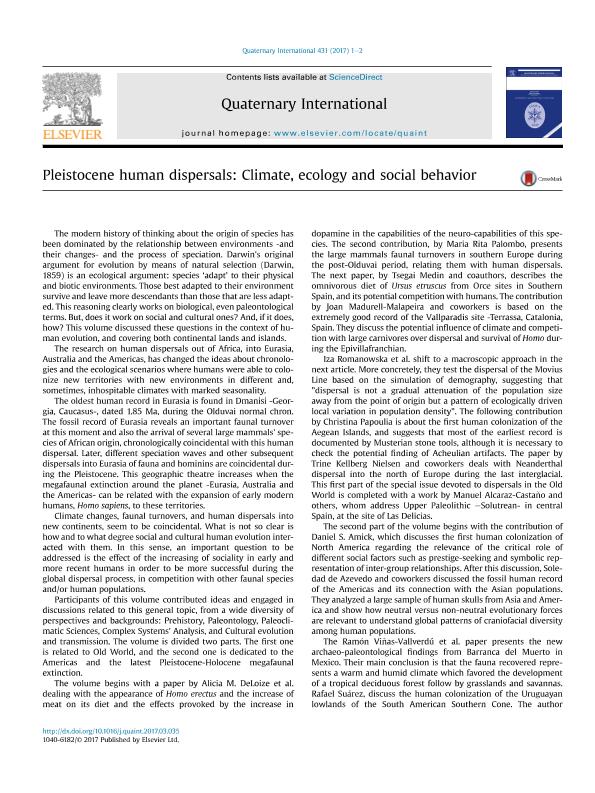Mostrar el registro sencillo del ítem
dc.contributor.author
Lanata, Jose Luis

dc.contributor.author
Lozano, Sergi
dc.contributor.author
Martinez Navarro, Bienvenido

dc.date.available
2018-09-06T15:30:22Z
dc.date.issued
2017-02
dc.identifier.citation
Lanata, Jose Luis; Lozano, Sergi; Martinez Navarro, Bienvenido; Pleistocene human dispersals: Climate, ecology and social behavior; Pergamon-Elsevier Science Ltd; Quaternary International; 431; 2-2017; 1-2
dc.identifier.issn
1040-6182
dc.identifier.uri
http://hdl.handle.net/11336/58519
dc.description.abstract
The modern history of thinking about the origin of species hasbeen dominated by the relationship between environments -andtheir changes- and the process of speciation. Darwin's originalargument for evolution by means of natural selection (Darwin,1859) is an ecological argument: species ?adapt? to their physicaland biotic environments. Those best adapted to their environmentsurvive and leave more descendants than those that are less adapted.This reasoning clearly works on biological, even paleontologicalterms. But, does it work on social and cultural ones? And, if it does,how? This volume discussed these questions in the context of humanevolution, and covering both continental lands and islands
dc.format
application/pdf
dc.language.iso
eng
dc.publisher
Pergamon-Elsevier Science Ltd

dc.rights
info:eu-repo/semantics/openAccess
dc.rights.uri
https://creativecommons.org/licenses/by-nc-sa/2.5/ar/
dc.subject
Human Dispersal
dc.subject
Pleistocene-Holocene
dc.subject
Social Behavior
dc.subject.classification
Historia

dc.subject.classification
Historia y Arqueología

dc.subject.classification
HUMANIDADES

dc.title
Pleistocene human dispersals: Climate, ecology and social behavior
dc.type
info:eu-repo/semantics/article
dc.type
info:ar-repo/semantics/artículo
dc.type
info:eu-repo/semantics/publishedVersion
dc.date.updated
2018-08-31T13:47:37Z
dc.journal.volume
431
dc.journal.pagination
1-2
dc.journal.pais
Estados Unidos

dc.journal.ciudad
Nueva York
dc.description.fil
Fil: Lanata, Jose Luis. Consejo Nacional de Investigaciones Científicas y Técnicas. Centro Científico Tecnológico Conicet - Patagonia Norte. Instituto de Investigaciones en Diversidad Cultural y Procesos de Cambio. Universidad Nacional de Río Negro. Instituto de Investigaciones en Diversidad Cultural y Procesos de Cambio; Argentina
dc.description.fil
Fil: Lozano, Sergi. Universitat Rovira I Virgili; España. Institut Català de Paleoecologia Humana i Evolució Social; España
dc.description.fil
Fil: Martinez Navarro, Bienvenido. Universitat Rovira I Virgili; España. Institut Català de Paleoecologia Humana i Evolució Social; España. Institució Catalana de Recerca i Estudis Avancats; España
dc.journal.title
Quaternary International

dc.relation.alternativeid
info:eu-repo/semantics/altIdentifier/doi/https://dx.doi.org/10.1016/j.quaint.2017.03.035
dc.relation.alternativeid
info:eu-repo/semantics/altIdentifier/url/https://www.sciencedirect.com/science/article/pii/S1040618217304871
Archivos asociados
